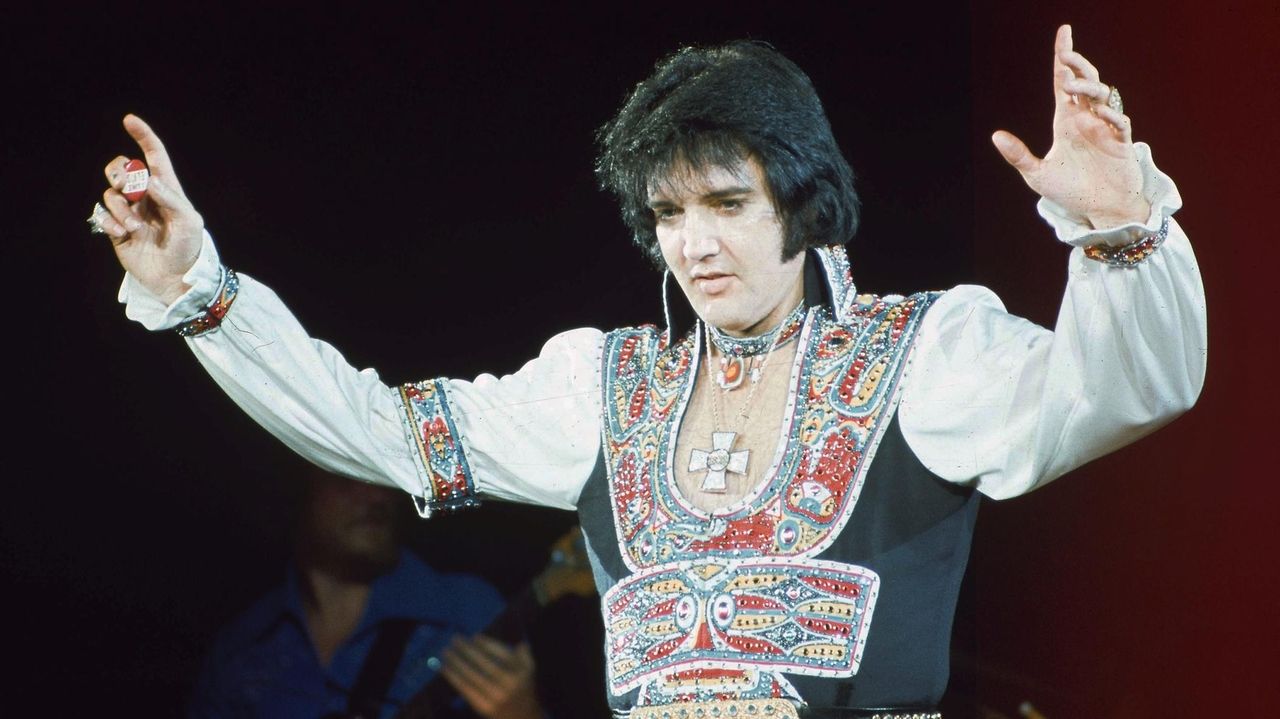Katherine Corlis remembers hearing from a co-worker that Elvis Presley had died. Corlis, then a staffer at a hospital, refused to believe it – after all, she had purchased 40 front-row tickets for herself and others to see Presley’s upcoming concert at Nassau Coliseum. But after a television broadcast confirmed the news, Corlis, who grew up in Levittown, recalls, she collapsed into the arms of a security guard who carried her to an emergency room for a shot of Valium.
“He was such a big part of my life,” Corlis, now 81 and living in Florida, says of Presley. “I really loved him.”
It was almost 50 years ago that Presley’s death – on Aug. 16, 1977 – sent shock waves around the world. For Long Islanders, the loss was especially acute: Presley had been scheduled to play a rare show at Nassau Coliseum the following week, on Aug. 22. Instead, thousands of fans showed up that night to hold a memorial for their fallen King.
Here’s a look back at how Long Island responded to the loss of a rock and roll icon.
By the late 1970s, Presley’s youthful persona – the hip-swiveling rocker who brought Black blues and subversive sexuality to white teens in the 1950s — was long gone. Presley had already served a career-derailing stint as an Army draftee (from 1958 to 1960), then starred in a string of oft-derided films such as “Blue Hawaii” and “Speedway.” Nevertheless, his eponymous 1968 television special on NBC marked a triumphant comeback, and he followed it with the 1973 live broadcast “Aloha From Hawaii via Satellite,” also on NBC.
But his marriage to Priscilla Presley ended that same year and his health, already declining, took a dramatic downturn. Immediately after filming the “Aloha” special, Presley’s weight ballooned and the singer was regularly ingesting pain killers, liquid Demerol and anti-depressants, according to Peter Guralnick’s biography “Careless Love.” His concerts during the 1970s could be unpredictable: Critics might find him “in good humor” one night but showing “lack of stamina and poor vocal projection” the next.
On Long Island, though, Presley remained a figure of fascination. In his long touring career, he had avoided the New York metro area until 1972, when he staged a three-day, four-show run at Madison Square Garden. . Even more exciting for Long Islanders: Presley began coming to Nassau Coliseum. In June 1973 he played four shows there: One on the 22nd, two on the 23rd and another on the 24th. He came back again in 1975 to play two shows on July 19. It seemed as though Long Island could become a regular stop for the Presley touring machine.
Sure enough, Presley’s 1977 tour dates included the Coliseum on Aug. 22.
But on Aug, 16, Presley’s fiancée, Ginger Alden, found the singer unresponsive on a bathroom floor in his Graceland mansion. Attempts to revive him were unsuccessful, and Presley was pronounced dead at the Baptist Memorial Hospital in Memphis that afternoon. He was 42.
Fans across Long Island mourned. They gathered in a parking lot in Oceanside, bringing their memorabilia with them. They met in the Lynbrook home of a fan club president to share stories and call other bereaved fans. “His passing deeply saddened me,” John Farro of Dix Hills, then 28, told Newsday that night. “I felt like a lost a brother.”
Dottie Brach of Bayport, 29, was “walking around in a daze,” she said. “Like, I can’t believe that this could happen to the King.”
On the day Elvis would have played the Coliseum, some 5,000 fans gathered in the parking lot with the venue’s permission. Out of 16,700 tickets sold – more than $200,000 worth — only 1,250 were returned for refunds, Ed Orgon, a Coliseum representative, told Newsday at the time. People had written to the venue urging it to use the money to build a memorial to Presley, he said, but “if the money is unclaimed after one year it must be turned over to New York State as unclaimed property.”
Corlis says she still has her tickets and doesn’t plan to sell them. “At one time they were worth $10,000,” she says, “but I didn’t care. I wanted the tickets.”
